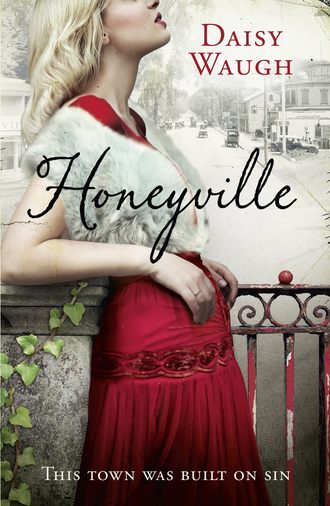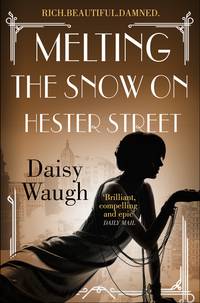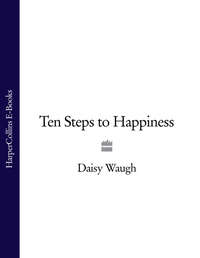
Полная версия
Honeyville

HONEYVILLE
DAISY WAUGH

Published by HarperCollinsPublishers Ltd 77–85 Fulham Palace Road Hammersmith, London W6 8JB
www.harpercollins.co.uk
First published in Great Britain by HarperCollins Publishers
Copyright © Daisy Waugh 2014
The following are copyright lines to be used as applicable
Cover layout design © HarperCollinsPublishers Ltd 2014
Cover design by Becky Glibbery. Cover photographs © Sarah Ann Wright / Trevillion Images (woman); Ilina Simeonova / Trevillion Images (clothing); akg-images (street scene); Shutterstock.com (railing, pillar)
Daisy Waugh asserts the moral right to be identified as the author of this work.
The Nice People of Trinidad © Max Eastman published in The Masses July 1914 reprinted with permission of the Estate of Yvette Eastman.
A catalogue copy of this book is available from the British Library.
This novel is entirely a work of fiction. The names, characters and incidents portrayed in it are the work of the author’s imagination. Any resemblance to actual persons, living or dead, events or localities is entirely coincidental.
All rights reserved under International and Pan-American Copyright Conventions. By payment of the required fees, you have been granted the non-exclusive, non-transferable right to access and read the text of this e-book on screen. No part of this text may be reproduced, transmitted, down-loaded, decompiled, reverse engineered, or stored in or introduced into any information storage and retrieval system, in any form or by any means, whether electronic or mechanical, now known or hereinafter invented, without the express written permission of HarperCollins.
Source ISBN: 9780007431779
Ebook Edition © November 2014 ISBN: 9780007500406
Version 2014-09-24
PRAISE FOR DAISY WAUGH
‘The delicately constructed plot keeps you guessing until the end’
TLS
‘Unputdownable’
Daily Mail
‘Dazzlingly evoked’
Sunday Times
‘Gripping … powerful, evocative’
The Lady
‘A gripping, bittersweet love story’
Sunday Times
‘Impeccably researched and beautifully written’
Daily Mail
‘Daisy Waugh delivers her engaging tale with wit and a real lightness of touch’
Literary Review
‘Written in deft, engrossing prose, this story is dizzy with glamour and heartbreak’
Easy Living
Wilson, Jenny Wilson
This book is for you.
Contents
Title Page
Copyright
Praise for Daisy Waugh
Dedication
1
2
3
4
5
6
7
8
9
10
11
12
13
14
15
16
17
18
19
20
21
22
23
24
25
26
27
28
29
30
31
32
33
34
35
36
37
38
39
40
41
42
Acknowledgements
Read on for more from Daisy Waugh
Keep reading… Last Dance With Valentino
Keep reading… Melting the Snow on Hester Street
About the Author
Also by Daisy Waugh
About the Publisher
1
April 1933 Hollywood, California
I saw Max Eastman last night. He turned up at dinner very late, apologizing to us all as if the evening had been on hold for his arrival, and it occurred to me how lonesome it must be to shine the way Max does, to feel that you can never simply slide into a room and sit down. I don’t think he knows any other way to behave, except as the star of the show.
He arrived with a little writer friend – one of these East Coast novelists, trying to recoup a living from the studios. I don’t remember his name. There were twenty-five or so places laid at the table and I had no idea Max was joining us. Our hostess never mentioned it – I imagine because she wasn’t aware of it herself, until he walked through the restaurant door. Max Eastman is quite a celebrity, after all. And we do love a celebrity in this town.
When he loped into the room last night, I’ll be honest: my heart stopped. And this morning, when I opened my eyes, my face was covered with tears. I’ve never experienced it before – to wake, from crying. Had I been dreaming? I can’t remember. But I woke with a hundred images swimming through my head. Of Trinidad, Colorado, as it was almost twenty years ago. Of Xavier, as he was then. Of myself. Of Max and Inez as they were together; and the blood drying on the old brick pavements.
I still have the letter she wrote to him, its envelope spattered in Trinidad’s blood. When he loped into the room I felt many things: shock, delight, anger, affection, regret … and an image of the damn letter came to mind, yellow with age, brown with blood, nestling at the bottom of my jewel box. I felt ashamed. I should never have read it. I should have sent it on to him twenty years ago.
There was an empty place beside me at the long res- taurant table, and Max flopped himself into it with the same long-limbed, bashful elegance that was ever his.
‘Is it taken?’ he asked, though he’d already pulled back the chair.
‘Please!’ I said. ‘Sit!’ But I didn’t look at him directly. I was embarrassed. Either he would recognize me or he wouldn’t, and I wasn’t prepared for either.
Max made himself comfortable. He took the napkin from his empty plate and dropped it still folded onto his lap. He reached for the wine and sloshed it into both our glasses. He had been at the theatre, he explained, having sat through what was ‘possibly the lousiest play I’ve seen all year. And I only went out of loyalty. Which is always a mistake, isn’t it? Now I shall have to think of something encouraging to say about the damn thing … And I’m terribly fond of the writer, so God knows, I’ll have to come up with something …’
He asked if I had seen the play. I told him not, although I had heard good things spoken of it. ‘Well don’t!’ he cried. ‘If your life depends on it.’ And he proceeded to pull the wretched thing apart.
‘Max, old chum!’the East Coast novelist shouted at him across the table. ‘Forget about the darned play, won’t you? I’ve been telling the guys about your adventures in Marmaris. Why don’t you tell them yourself?’
‘Not Marmaris,’ Max said, looking pained. ‘I was in Büyükada.’ He pronounced it Buy-u-khad-a with the soft notes and little hisses, like a man who knew what he was about.
He had just returned from a week in Buy-u-khad-a, he explained, visiting with his old friend-in-exile, Leon Trotsky.
‘I’m amazed he’s still alive,’ the novelist said. ‘It can only be a matter of time before Stalin sends his people to take a pop.’ He made a limp white pistol shape of his hand.
And Max was off. It was his favourite topic: if not the domestic particulars of Trotsky’s new life in Turkey (which fascinated us trivial Hollywood folk), then the failure of communism, the evil of Stalin, the tragedy of post-revolution Russia. His trip to Büyükada had obviously been a failure.
‘It was quite a trek, after all. To come from Antibes, and I came with one single object in mind: to offer comfort to my old friend. Because he simply exists out there, you know? Plotting and brooding – waiting. It’s rather pathetic. One ear out for the pop.’
‘Pop,’ the novelist said. ‘Awful.’
‘Last time I laid eyes on the fellow we were in Moscow!’ Max continued. ‘Stalin was a nobody – a booby. A nothing. It was Leon who held the future in his hands … We believed in a new world … We were friends!’ Max paused. He fiddled with his napkin, furrowed his brow and I don’t suppose there was a person at the table who didn’t want to stretch across and smooth it for him. ‘Do you know,’ he said at last, ‘in all the week he and I spent together in Büyükada, Leon didn’t ask me a single question about my life.’He looked around at the table. ‘Isn’t that rather extraordinary?’
The conversation turned back to movies. (You can’t keep the conversation from movies for long in this town.) They were discussing the special effects in King Kong but I couldn’t contribute. After a moment or two, Max turned to me: ‘I’m guessing you and I may be the only people in this town who haven’t yet watched it, right?’
‘I think so,’ I smiled.
And then, finally, came the pause I suppose I had been waiting for. He took up his wine glass, and slurped from it in a show of nonchalance – not for me, but for everyone else. He leaned in close.
‘We’ve met before, Dora,’ he said.
‘Well of course we have, Max,’ I said, maybe just a half-second late. I had almost lulled myself into imagining the danger was passed. I smiled into his honest eyes, until he blinked. ‘Don’t tell me you have only now remembered?’
‘Certainly not,’ he said. ‘I spotted you at once! Why do you think I made such a beeline for the seat?’
‘It was the only one that was empty.’
He laughed, and shook his head. ‘You know, you don’t look a day older,’ he said.
And I said – the difference being that, in his case, except for the grey in his hair, it was true: ‘Neither do you, Max. Not a day older. You must have a portrait in an attic somewhere.’
‘Ha! Yes. I think maybe we both do. Gosh – but it’s terrific to see you, Dora. I mean … Don’t you think so?’ He sounded uncertain – as uncertain as I felt. ‘It’s too incredible! Here we are. Still standing. After all these years.’
‘Here we are,’ I repeated. ‘Still standing!’
‘Oh, but you must know I recognized you, Dora!’ He sounded a little petulant. ‘How could I possibly not?’
‘Well, I recognised you, of course. But you’ve gotten so famous since. I see your photograph.’ I smiled at him. ‘I guess I had the advantage.’
‘I would have greeted you as soon as I sat down. But then when you didn’t acknowledge me …’ He looked so tactful and tortured I had to struggle not to laugh. ‘I imagine that your particular situation … I mean, you look so terribly well, Dora. And I didn’t want to advertise the circumstances. Not that …’
‘Well, it would be nice if you didn’t stand on the table and shout the absolutely exact circumstances. One has to maintain a semblance of respectability. In these autumn years. Don’t you think? Even in Hollywood.’
‘Ha!’ he bellowed. ‘We surely do! Even in Hollywood!’ We laughed, and the long years since last we met seemed to fade away. ‘Well, I apologize,’ he said. ‘Please accept my apology. I was trying to be chivalrous. In my oafish way. But I’m a fool. I see it now.’
His hand was on the table top between us, long fingers busy rolling small crumbs of bread. So much anxious energy still! I felt a rush of affection for him. ‘Dear Max,’ I said. ‘Ever chivalrous.’ He grimaced, as well he might. But I had meant it. At least, I had meant it up to a point.
The novelist was yelling at him again – something emphatic about Charlie Chaplin. This time Max ignored him. He said: ‘You remember that crazy evening, Dora? The first night. It was anarchy – the striking miners had taken over the streets, and she was just buzzing with it all. I never saw a woman quite so alive. I remember looking at her that night – in the Toltec saloon – with the guns rattling out there on Main Street. She was beautiful. God. The woman of my dreams. I think I fell in love, right there and then.’ He laughed, shaking his head. ‘Don’t you remember? It was so damn exciting.’
Of course I remembered.
‘We truly believed the world was going to change. Or maybe not you, Dora. You’d seen too much of the world already. But during the siege – those ten crazy days – the rest of us: John Reed, God rest his soul, and me and Upton, and Inez of course – and all the reporters who piled in. We believed it! The world was actually going to change. Not just in Colorado …’
‘Ten Days That Shook the World.’
‘Ha! That’s right. Only imagine. John might have written it about our own, home-grown revolution.’
‘And thank God he didn’t,’ I said.
Max nodded energetically. In the intervening years, since returning from Russia, he had undergone a political volte-face that (according to the newspaper articles I read) had made him enemies on both sides. ‘It seemed possible, though, didn’t it? Colorado might have been just the beginning. It was …’ he paused, seeming to lose himself in thought. ‘You remember that Union chap, used to hang around Inez? Handsome as hell – I was rather jealous of him.’
‘Lawrence O’Neill.’ I laughed. ‘You didn’t need to be jealous of him, Max. Inez adored you. But yes, I remember him.’
‘Well he was another, turned up in Moscow later. Or, not in Moscow, actually. Dear God.’ He sighed. ‘That is … Last I heard, he was on his way to Solovki. Poor bastard.’
Solovki Labour Camp. Poor bastard, indeed. Even here in sunny California, the name Solovki resonates with everything that is cruel and broken in the New Russia. Lawrence O’Neill hadn’t crossed my mind in many years, but I was shocked – of course I was. Shocked and very sorry. I had been fond of him. ‘But didn’t he fight on the side of the revolution, just like the rest of you? What did he do so terribly wrong?’
Max looked at me, pityingly. He sighed with enor- mous weariness, appeared to hesitate, and then to think better of answering: ‘Oh God, but Dora,’ he said instead, brightening in a breath, ‘don’t you re- member darling Inez – and her terrible, dreadful, awful, appalling poem?’Grinning, he pulled back his shoulders, threw back his head: ‘For the strikers shall fight and they shall fall …’
‘Fight Freedom!’I cried.The words came to me as if I’d heard them yesterday. Max and I both remembered the poem perfectly and we finished it together with our fists aloft:
And they will rise
And they will call –
Fight Freedom!
’Til all
In America is fair
And the wind in the trees blows freedom to our streets and all
Good-Americans-take-care-and-pledge-forever-themselves-to-share …
She had gone out that morning with Max and a whole bunch of other reporters, to see the carnage for herself. The guards hadn’t allowed her into the camp, of course. But she had smelled it, seen it, felt it, and she was wild with righteousness, buzzing with the horror – crazier than I had ever seen her. We were in the Toltec saloon, a great gang of us, and from the hidden pocket of that pantaloon skirt she was so proud of (it celebrated her status as a ‘modern woman’), in front of all the cleverest in America (or so it seemed to us then: really it was a motley crew of poets and writers, intellectuals and newspaper columnists who had descended on Trinidad that week), Inez pulled out a sheet of paper. She announced that she had written a poem.
I tried to stop her. Max, with all his wit and chivalry, had tried to stop her, too. But Inez had written the damn thing. She would not be silenced.
Upton and the others had leapt on the opportunity to mock her, as Max had known they would. And as the evening progressed and more liquor was consumed, they began to chant poor Inez’s ridiculous poem aloud – and fall off their chairs with laughter – only to climb back onto them and begin chanting the wretched thing again. Inez took it on the chin. Bless her, I don’t think she cared a bit. She simply laughed and chanted along with them. ‘Y’all wait and see,’ she said. ‘It’ll catch on!’ … The smell of young, burning flesh still lingered on the prairie that night, and we knew it. But it was a wild night. I do believe we were never happier.
‘Fight Freedom!’ muttered Max, lost in his memories. He pushed his plate away and hunched over his long legs, deep in thought. ‘The last time I saw her, we had a most idiotic squabble,’ he said at last. ‘Like a couple of spoiled kids.’
I knew it already, from the letter. But I could hardly admit to that. ‘I’m not surprised,’ I said.
‘Hm?’
‘Well. I read the article you wrote.’
He hesitated. ‘You mean – the tea party piece?’
‘The one she helped you with.’
‘Oh. Gosh, no.’ Max laughed. ‘That wasn’t what we fought about.’
‘Oh, I think it was! She was mortified.’
‘Nonsense!’ He laughed again. ‘I was reporting a story, Dora! It was why I ever came to Trinidad in the first place. She understood that perfectly. Besides …’ He stopped, seemed once again to think better of whatever he was about to say. ‘I’d offered her a job on the magazine! She’d already sent on half her luggage!’
‘I know. I helped her to pack it. She was so excited.’
‘So don’t tell me,’ he laughed, ‘don’t tell me that kid didn’t know what she was about.’
‘I don’t think she had the faintest idea. I don’t think there was ever a “kid” more out of her depth.’
But he didn’t seem to hear. ‘We used it as a perching-place in our editorial meetings for years, you know. “Inez’s Packing Case”. We used to read submissions aloud and if something was truly, spectacularly bad, one of us would sort of launch something at the packing case, and shout out—’
‘Fight Freedom?’
‘Fight Freedom.’ He sighed again. ‘Well. It was funny back then, I guess. I still have that case somewhere. That’s right. The darned packing case arrived OK. But Inez? Never turned up. I wrote her. A bunch of letters.’
‘You wrote to her?’
‘After we printed the tea party piece.’ He had the grace, at last, to look at least a little shamefaced. ‘When she didn’t materialize in New York.’
‘Where did you send the letters?’
He shrugged. ‘I don’t remember. A post-office box? It’s been a long time, Dora.’
‘I never saw any letters. I wonder what became of them?’
‘Well – but never mind the letters, Dora.’ He leaned towards me. ‘For God’s sakes, never mind the letters. What became of her? That’s what I’ve been trying to ask you. What became of Inez? She simply disappeared.’
Max told me last night that he was here in Hollywood on one of his famous speaking tours. It’s why he has come to California. He is on an anti-communist speaking tour. I think. Or maybe an in-favour-of-poetry tour. He is still a poet, after all. Last I heard him speak, twenty years ago, he was stirring up revolution in the bloody coalfields outside Trinidad, Colorado. He was a fine speaker, too. Passionate. Persuasive.
In any case, they must be paying him well. They have put him up at the Ambassador for the entire week. And I am invited to lunch with him again on Friday, which is just five days away. I have told him about her letter. I have told him I will deliver it to him at last.
We have plenty to catch up on, I think.
2
August 1913 Trinidad, Colorado
Inez and I were in the drugstore on North Commercial the first time we met. Under normal circumstances, Trinidad being Trinidad and we ladies both knowing our place, we would never have exchanged a word. I would have gazed at her from beneath the rim of my extravagant hat and wondered how she could put up with the limits of her respectable life: and she would have looked at me, from beneath the rim of her more restrained affair and felt – what?
Pity, probably.
And irritation about the hat. I dressed flamboyantly, in silks and lace and satin. It’s what made me all but invisible to the good ladies on Main Street, and in the drugstore on North Commercial.
There were no other customers in the store that day. It was just the two of us. Behind the counter, Mr Carravalho was coaxing Inez into parting with a few extra dollars for a skin-freshening potion which, had I been inclined, I might have told her didn’t work, since I had already tried it myself. I might have told her that she didn’t need any such potion in any case. Her skin was quite fresh enough. Everything about her seemed, in my weary state, to sing with a freshness and vim long since lost to me.
I knew who she was. Inez Dubois cut quite a dashing figure in our small town. She worked at the library, though it was generally believed that she had money of her own, and no need to work. She was unmarried, so far as I knew, about 26 or 27 years old. She lived with her aunt and uncle, Mr and Mrs McCulloch, who owned one of the finest houses in Trinidad, and she ran around town in her own little Ford Model T motorcar.
She looked, I used to think, rather like a beautiful doll: with small, pointed nose, and thick golden hair and round grey eyes, and a tiny, slim body that seemed to fizz with energy and life. I had seen her driving up Main Street towards the public library, her scarf flowing behind her, just like Isadora Duncan. And I had seen her at the issue desk in the library. In fact, on several occasions, being an enthusiastic reader, I had presented her with novels to stamp (respectable novels, I should add, nothing like the filthy French novels dear old William used to send me. They didn’t stock those at the Carnegie Library of Trinidad). There were occasions when I sensed she might have liked to talk, if only to share her literary opinions of the novels I was borrowing. But she always stamped and returned them without quite looking my way.
So there we were in Carravalho’s Drugstore. I was waiting in line to stock up on the usual medications, essential for my trade. Mr Carravalho knew me well and would have a package already prepared for me, and I was in no hurry. Which was fortunate, since Inez Dubois was taking her time. She was fussing and flirting with Mr Carravalho, informing him of her dire need to buy ‘something’to refresh her look, what with the heat of this long summer.
It was a warm August evening – a beautiful evening, after a burning hot day, and it being a Friday, there was much noise and festivity on the street. Beneath the rattle of the tram and the Salvation Army choir, singing its lungs out on the corner of Elm Street, there came laughter and chatter in a score of different languages. It was the busy, noisy, carefree sound you only heard in Trinidad when the hot, dust-filled prairie wind had eased at last, and the sun had cooled, and the long working week was almost over. Miners from the neighbouring camps were piling in off the trolley cars, the brick-factory workers were making their way from the north end of town, and the distillery workers too, and the shop clerks, the farm hands and the cattlemen, the hustlers, the rangers: they were all on the streets that evening. Trinidad was wearing its glad rags. I remember reflecting that it would likely be a busy night at Plum Street.
The door to Mr Carravalho’s shop stood open as I waited, and I was content to linger there, catching the evening breeze, listening in on the chatter. But my tranquillity was interrupted suddenly by angry shouts from the street. There, framed by the store’s door and only a few yards from where I stood, three men had appeared as if from nowhere and, in the space of a second – the second it took for me to locate them – a violent fight had broken out between them.








